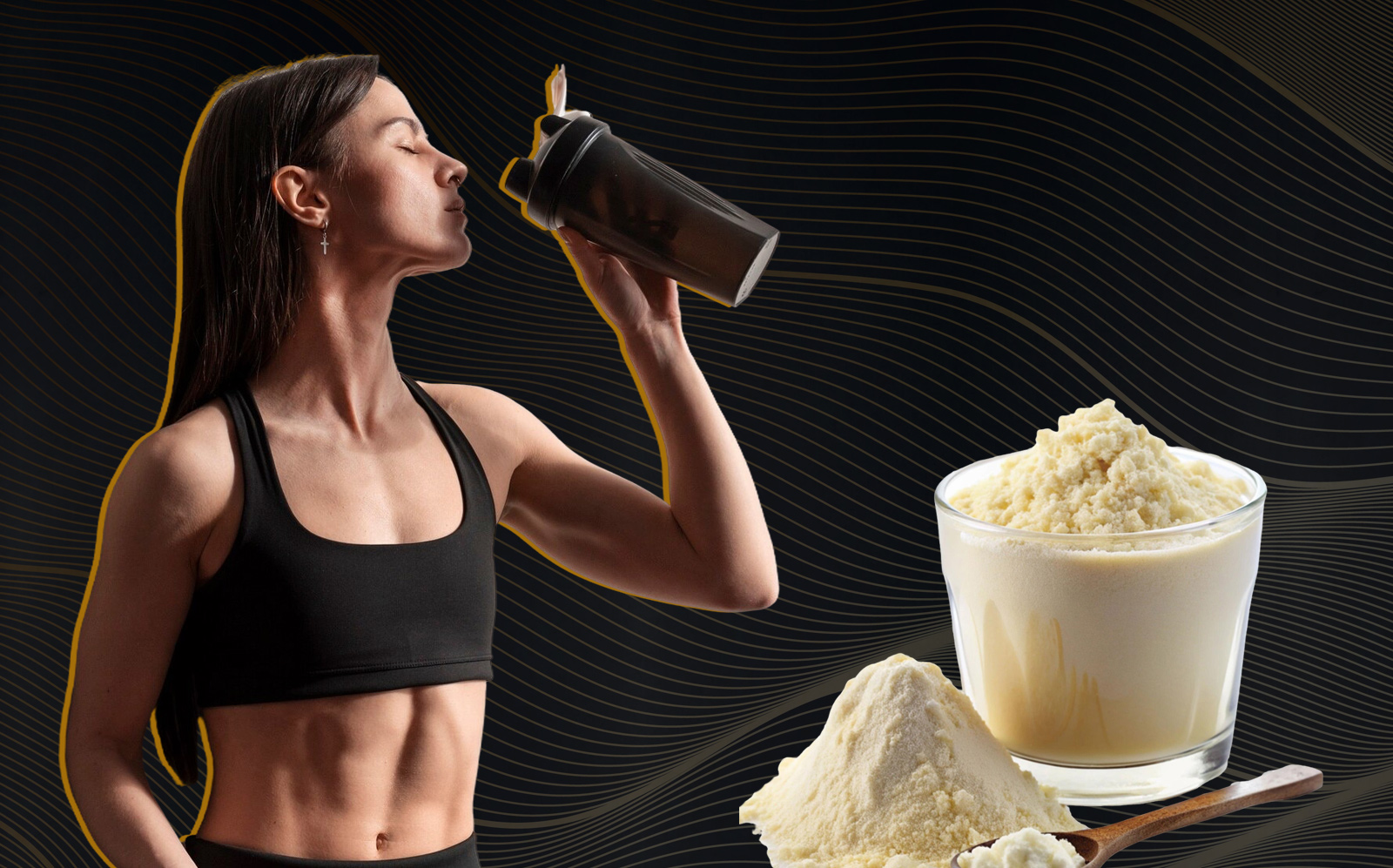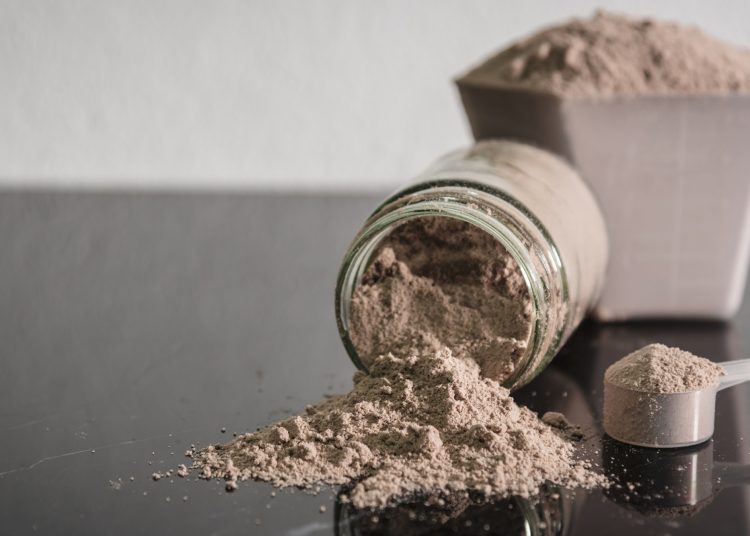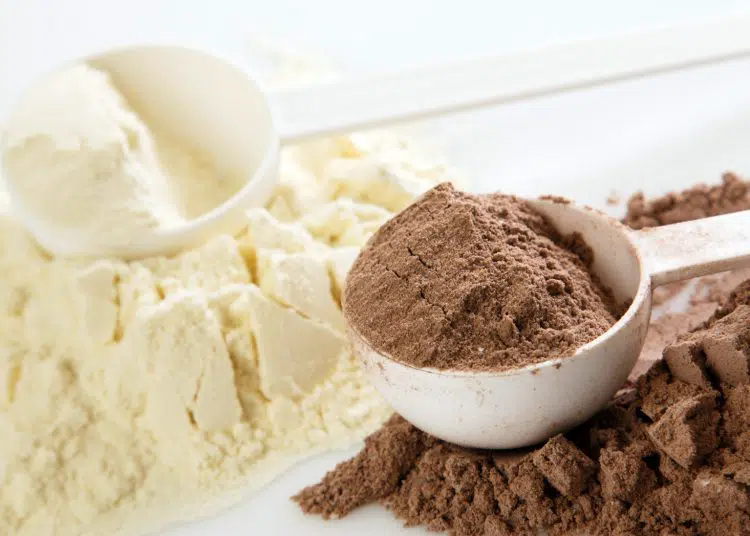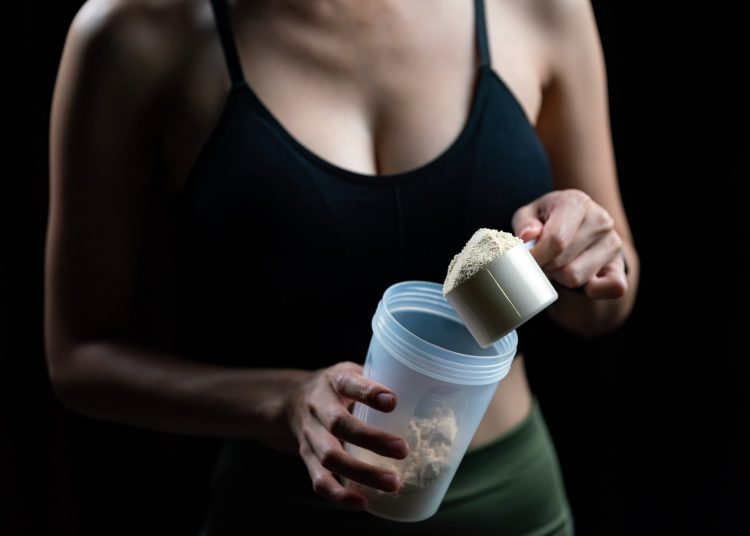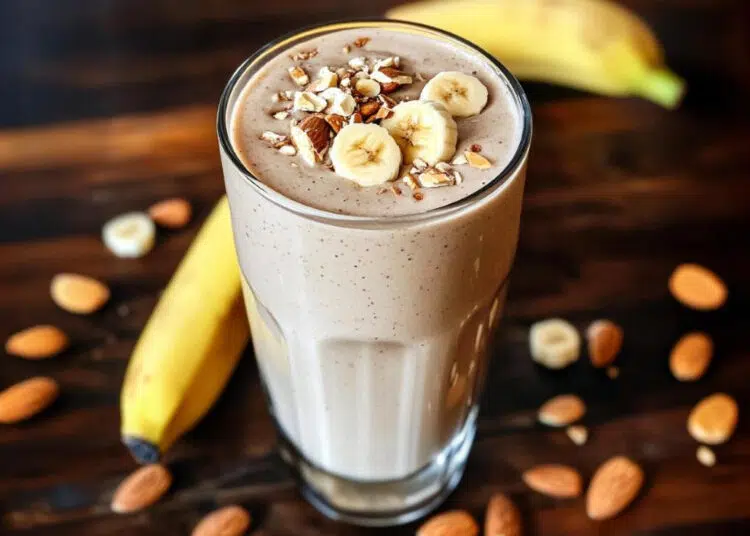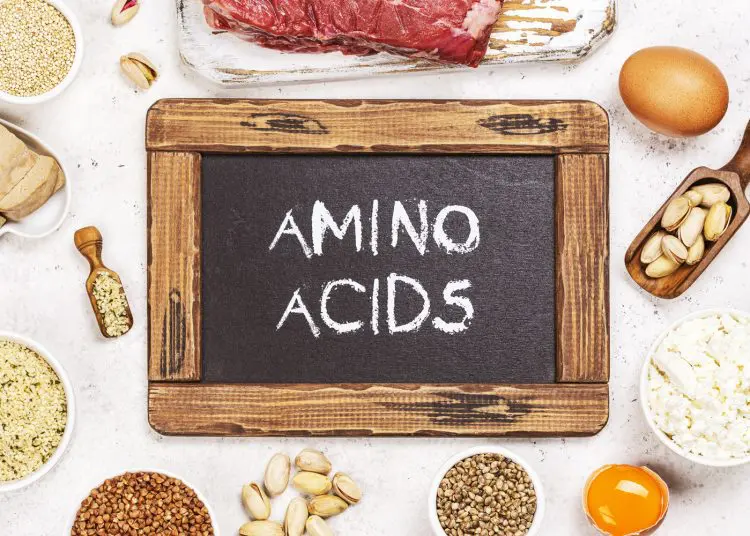Most athletes reach out for their trusty protein shake after a killer workout to maximize recovery and gains. Just when they begin to feel good about fueling their body, they experience that dreaded rumble in their stomach.
You, too, have likely faced the infamous pressure after gulping down a protein shake.
Puffiness, bloating, and pressure after drinking a protein shake signal an underlying digestive issue. The good news is that you don’t have to accept this discomfort as a part of the transformation process.
In this article, I reveal the three most common protein shake-related digestive issues. I’ll also share tips on how you can avoid these mistakes to maximize your fitness potential.
1. Relying on Low-Quality Protein Concentrates
Without further ado, let’s talk about the three main reasons behind the post-protein shake bloat.
There are several types of whey protein supplements, and your body reacts to each one of them differently. As a coach, I have worked with hundreds of athletes, and I can tell you that the source of your protein can make a huge difference in your gut health and performance.
Here are the most popular types of protein you should know about:
Whey Protein Concentrate
This is the most popular and affordable form of protein powder. It undergoes basic processing from whey, a byproduct of cheese production. While whey concentrate contains a decent amount of protein, it also has a higher level of lactose, fats, and carbohydrates.
Whey Protein Isolate
Isolate protein goes through additional processing to remove most of the lactose and fat. The final product is a higher protein percentage per serving, making it easier to digest, even for lactose-sensitive people.
Whey Protein Hydrolysate
This form of whey takes the processing a step further as it has been pre-digested, meaning the protein molecules are broken down into smaller peptides. Hydrolysate is the best form of whey protein for people who struggle with bloating and discomfort after drinking a shake.
Casein Protein
Casein protein digests much slower than whey. It is great for people who want sustained protein release. This form of protein is often taken before bed. However, its slow digestion can lead to feelings of fullness and bloating in some cases.
Plant-Based Protein
Plant-based protein powders are a popular choice for folks who are lactose intolerant or follow a vegan lifestyle. Depending on the ingredients, it can cause bloating and flatulence, as plant-based proteins are naturally high in fiber content.
Tips For Choosing the Right Protein Powder
Consider the following factors when buying a whey supplement:
- Consider lactose sensitivity: Whey protein concentrate is a popular choice due to its lower cost. However, you must opt for a protein isolate or hydrolysate if you are lactose-sensitive or lactose-intolerant.
- Read the ingredient list: Besides lactose, other components, like certain fats and carbs, can also cause digestive upset in some individuals. Take your time and carefully examine the ingredient list to scan for added fillers and excessive amounts of sugar. Remember, a shorter ingredient list with recognizable components is always better.
- Look for reputable brands: Buying from a popular brand increases the chances that you will get a high-quality product. Cheaper whey concentrates usually contain fillers, artificial ingredients, and sweeteners that can improve taste but hinder digestion.
- Experiment with different types: There is only one way to know which protein supplement works the best for you — you have got to try as many of them as possible until you find the one.
2. Chugging Your Protein Shake Too Fast
As someone who spends most of his days in the gym, I can attest that most people chug their protein shakes like the world’s about to end.
While drinking your protein shake as quickly as possible might be convenient, it can trigger three problems that can increase the risk of indigestion.
First, the bottoms-up approach leads you to swallow a significant amount of air alongside the protein-rich liquid. This air gets trapped in your digestive tract, causing that distended and uncomfortable feeling.
Furthermore, lifters on a muscle-building program usually consume more than one scoop of protein after their workout. When you flood your gut with a large volume of liquid, particularly one as concentrated as a protein shake, it can struggle to process it efficiently.
When you gulp down a protein shake, your body does not have enough time to recognize the incoming nutrients or release the necessary digestive enzymes in your mouth and stomach. Chugging your shake bypasses this initial signaling phase, hindering the digestive process.
Consequences of Fast Absorption
Drinking your protein shake too quickly can make you feel uncomfortable and cause immediate bloating. People sensitive to lactose might also encounter stomach cramps. These symptoms are not only unpleasant but also hinder nutrient absorption, meaning that you are pouring the whey protein and your hard-earned money down the drain.
How To Stop Chugging Your Protein Shakes
People resort to fast consumption due to factors like urgency, taste, or convenience. Here is how you can consciously slow down to ensure your digestive system has enough time to cope:
Sip Instead of Gulp
I tell my clients to think of their protein shakes as fine wine. Instead of taking big gulps, focus on small, controlled sips. Just as you do with wine, taste the shake with every sip instead of trying to get it down as quickly as possible.
Take Breaks Between Sips
Contrary to what most people think, you don’t have to drink your protein shake in one go. Take a sip, put down the bottle, and return to it after a few minutes. This gives your digestive system a little breather.
In fact, research shows that your overall daily protein intake is more important than timing your protein after a workout to maximize hypertrophy. This is enough evidence to prove that you don’t need to finish your protein shake in one go. Give it 15 to 20 minutes, or even spread it out throughout the day. (1)
Use a Sipper Instead of a Blender Bottle
If you can’t help yourself and chug down the protein shake every time, I recommend opting for a sipper bottle with a straw instead of a shaker with a large opening. The sipper restricts the flow, making it harder to gulp down large amounts of protein at once.
Mindful Consumption
Avoid using your phone, talking to friends, or watching TV while drinking your protein shake. Instead, focus on the taste, texture, and how your body feels as you consume it. This mindful approach can help you slow down and pay closer attention to your body’s signals.
3. Overloading Your Shake with Bloat-Inducing Ingredients
If you have been around the gym scene for a while, you’ve probably seen people include all sorts of things in their protein shakes to spike their nutritional value.
However, this can do more harm than good if you have no idea of what you are doing. As we have already discovered, chugging down a whey protein concentrate shake can be pretty hard on your stomach. Adding a cocktail of complex ingredients to it only makes things worse.
Below are some of the most common culprits that you should be careful of:
Nut Butters
A spoonful of peanut butter can add healthy fats, texture, and flavor to your shake, but going overboard can cause digestive discomfort. The high fat content can slow down the digestive process, potentially leading to bloating.
Dairy
Using a whey protein concentrate and mixing it with regular dairy milk can increase the risk of lactose-related bloating. Milk should be a no-go for people who have difficulty digesting normal whey protein shakes.
Excessive Fruits
Blending fruit into your protein shake can be a healthy way to add flavor and nutrients, but excessive amounts of fruit can introduce a large dose of fructose that can cause bloating in some people if not absorbed properly in the small intestine.
Artificial Sweeteners
While most whey protein shakes already contain a ton of artificial flavors and sweeteners, many people add additional sweeteners, like sucralose and aspartame, to plant-based shakes to mask their earthy, muddy taste.
Besides being mindful about adding sweetness, fruits, dairy, and nut butter to your protein shakes, you must also weigh (pun intended) whether adding fiber to your post-training shake is worth it.
While fiber is generally healthy, high amounts of certain fibers, like inulin, can cause digestive distress in some individuals, especially when consumed in a liquid form.
What to Do Instead: Exploring Alternatives
Drinking a plain protein shake daily might sound boring. Here is how you can spice them up without hampering your digestion:
Essential Amino Acids (EAAs) and Branched-Chain Amino Acids (BCAAs)
Consider adding EAAs and BCAAs to your drink if you feel heavy and bloated after drinking a plain protein shake. These two are the building blocks of protein that your body can absorb rapidly to kickstart growth.
They don’t add any extra volume to the shake and won’t cause digestive distress.
Whole Food Protein Sources
Lean meats like chicken and fish, eggs, dairy, beans, lentils, and even tofu provide high-quality protein along with other essential nutrients. Plus, they are often easier to digest.
However, you might have to get creative when it comes to how you add them to your protein shakes. Some people prefer blending them, while others have whole foods on the side. The choice is entirely yours.
Understanding the Gut-Protein Connection
When you eat or drink protein, your body breaks down the molecules into smaller units called peptides. These then move into your small intestine, where more specialized enzymes chop them into individual amino acids, which are absorbed through the intestinal walls before heading into your bloodstream.
How Protein Shakes Behave Differently
Each food source has a different composition, and your body handles it uniquely.
For instance, your body processes protein shakes differently than grilled chicken breast. Protein shakes are highly concentrated liquids and bypass some of the initial breakdown that happens with solid food.
Due to this, protein shakes head relatively quickly to your small intestine. While this can be great for boosting your post-workout recovery, it can overwhelm your digestive system if the protein is not processed properly.
Digestive Symptoms
Many people have sensitivities to different components found in protein shakes, with lactose being a common culprit.
Your body must produce an enzyme called lactase to digest lactose. However, if your body doesn’t produce enough of it, you might experience bloating, gas, and digestive discomfort after consuming whey protein concentrate, which often contains a higher level of lactose.
Plus, many whey protein supplements also contain a ton of artificial sweeteners and additives that can harm your gut microbiome.
Experts consider the gut microbiome as the second brain of the body. These tiny organisms play a crucial role in digestion and overall health. A thriving gut microbiome can help break down food efficiently, but imbalances can lead to flatulence and bloating.
An inefficient digestive system is the core reason behind that awkward feeling of being overly full and tight after drinking a protein shake.
Poor digestion can lead to undigested food particles lingering in your digestive tract, which ferment and produce gas. This trapped gas is what causes that uncomfortable bloating.
Conclusion
Chugging your protein shake too fast, using poor quality concentrates, and adding too many ingredients can cause bloating and that infamous heavy feeling.
Making the changes explained above can lead to a more enjoyable protein shake experience. Plus, you can make all these modifications in one shot without causing any sort of disruption to your gut health or daily routine. Try it and let me know how it goes.
References:
- Schoenfeld BJ, Aragon AA, Krieger JW. The effect of protein timing on muscle strength and hypertrophy: a meta-analysis. J Int Soc Sports Nutr. 2013 Dec 3;10(1):53. doi: 10.1186/1550-2783-10-53. PMID: 24299050; PMCID: PMC3879660.
Tip: If you're signed in to Google, tap Follow.


